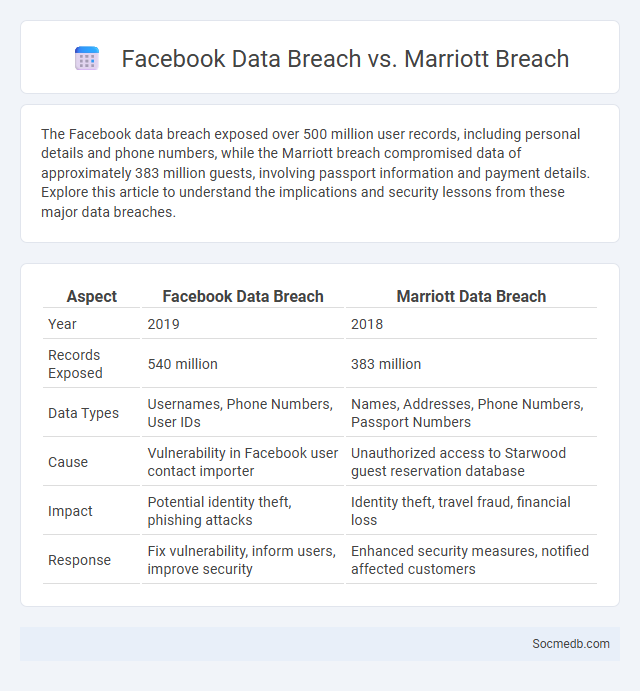
Photo illustration: Facebook Data Breach vs Marriott Breach
The Facebook data breach exposed over 500 million user records, including personal details and phone numbers, while the Marriott breach compromised data of approximately 383 million guests, involving passport information and payment details. Explore this article to understand the implications and security lessons from these major data breaches.
Table of Comparison
| Aspect | Facebook Data Breach | Marriott Data Breach |
|---|---|---|
| Year | 2019 | 2018 |
| Records Exposed | 540 million | 383 million |
| Data Types | Usernames, Phone Numbers, User IDs | Names, Addresses, Phone Numbers, Passport Numbers |
| Cause | Vulnerability in Facebook user contact importer | Unauthorized access to Starwood guest reservation database |
| Impact | Potential identity theft, phishing attacks | Identity theft, travel fraud, financial loss |
| Response | Fix vulnerability, inform users, improve security | Enhanced security measures, notified affected customers |
Overview of Major Data Breaches
Major social media platforms like Facebook, Twitter, and LinkedIn have experienced significant data breaches exposing millions of users' personal information, including email addresses, passwords, and phone numbers. Such breaches often result from vulnerabilities exploited by hackers or inadequate security measures, causing risks like identity theft and unauthorized account access. Protecting Your data requires vigilant use of strong passwords, two-factor authentication, and regular monitoring of account activity.
Introduction to Facebook Data Breach
The Facebook data breach exposed sensitive information of over 500 million users, including phone numbers, email addresses, and personal details, compromising privacy on an unprecedented scale. Your digital security is at risk when such massive data leaks occur, highlighting the importance of safeguarding personal information on social media platforms. This incident underscores the critical need for robust cybersecurity measures and vigilant monitoring of data usage by social networks.
Key Facts on the Marriott Data Breach
The Marriott data breach in 2020 exposed sensitive information of approximately 5.2 million guests, including names, mailing addresses, phone numbers, email addresses, passport numbers, and loyalty account details. The breach involved unauthorized access through compromised login credentials of two employees, leading to a significant risk of identity theft and financial fraud. Marriott promptly alerted affected customers and enhanced security measures to prevent future incidents.
Comparing Facebook and Marriott Breaches
Facebook and Marriott experienced significant data breaches impacting millions of users globally, with Facebook's breach exposing over 500 million user records, including personal data such as phone numbers and email addresses, while Marriott's incident compromised the information of approximately 383 million guests, including passport numbers and payment card details. You should be aware that Facebook's breach mainly targeted social media user data, increasing risks of identity theft and phishing attacks, whereas Marriott's breach posed threats to sensitive travel and financial information, highlighting the necessity for robust cybersecurity measures across industries. Both breaches underscore the critical importance of timely detection and response to protect personal information from widespread exploitation.
Common Causes of Data Breaches
Weak passwords and phishing attacks are among the top common causes of data breaches on social media platforms. You should be aware that inadequate account security measures and unauthorized third-party app access also contribute significantly to personal data exposure. Regularly updating your password and reviewing app permissions can help mitigate these risks.
Impact on Users and Organizations
Social media significantly shapes user behavior by influencing communication patterns, enhancing connectivity, and driving information dissemination at unprecedented speeds. For organizations, it serves as a powerful tool for brand building, customer engagement, and real-time feedback, but also presents challenges like reputation management and data privacy concerns. The dynamic interaction between users and organizations on platforms like Facebook, Twitter, and Instagram creates an ecosystem that continuously evolves in response to technological advancements and cultural shifts.
Regulatory and Legal Repercussions
Social media platforms are increasingly subject to stringent regulatory and legal repercussions, including data privacy laws like GDPR and CCPA designed to protect user information. You must ensure compliance with content moderation policies and intellectual property rights to avoid fines and legal action. Failure to adhere to these regulations can result in significant penalties, impacting your brand's reputation and operational viability.
Response and Mitigation Strategies
Effective response and mitigation strategies in social media management involve promptly addressing negative comments and misinformation to protect your brand reputation. Implementing real-time monitoring tools enables you to detect potential crises early and engage with your audience transparently and empathetically. Training your team on crisis communication and establishing clear protocols ensures swift, consistent action that minimizes damage and fosters trust.
Lessons Learned from High-Profile Breaches
High-profile social media breaches highlight the critical importance of robust cybersecurity measures, including multi-factor authentication and regular vulnerability assessments. Companies must prioritize user data encryption and promptly patch software vulnerabilities to prevent unauthorized access. Transparent communication with users during incidents fosters trust and mitigates reputational damage.
Preventing Future Data Breaches
Implementing advanced encryption protocols and multi-factor authentication significantly reduces the risk of unauthorized access to social media platforms. Regularly updating software patches and conducting security audits help identify and mitigate vulnerabilities before exploitation. Educating users about phishing attacks and promoting strong password practices strengthen overall data protection efforts against future breaches.
 socmedb.com
socmedb.com